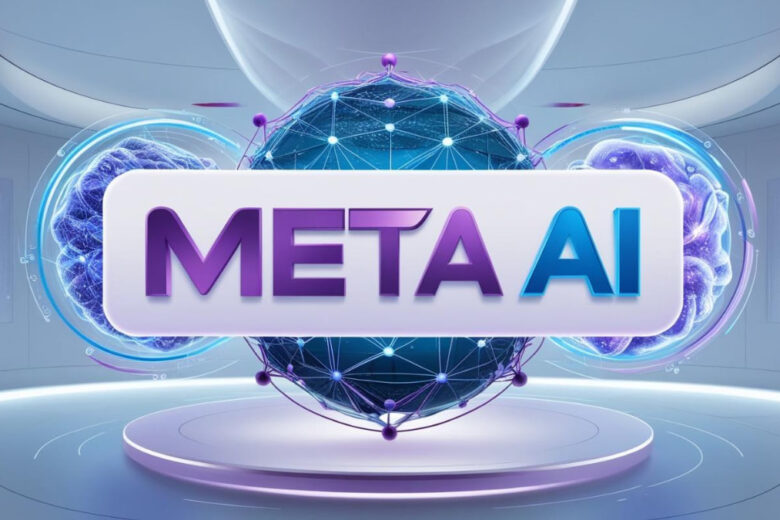In a world of increasingly fierce competition between tech giants, Meta AI (formerly Facebook) has fully entered the AI arena. The company, once known for its social networks, is now charting a future where AI plays a leading role. Meta shows several projects it doesn’t want to be left behind, from advanced chatbots to powerful language models and creative content creation tools. But how advanced is Meta’s AI? Can it be considered the best free AI? How does it differ from its competitors? And what does the future hold for digital users? In this article, we look at everything we know about Meta’s AI.
What is Meta AI?
Meta AI is built on Meta cutting-edge technology infrastructure. The technology uses advanced machine learning algorithms and natural language processing (NLP) techniques to generate text, dialogue, images, and video.
For OpenAI’s chatbot, which uses proprietary GPT-4o or o1 models that leverage the Gemini AI self-learning model, Meta is putting things in the public domain and allowing others to build something based on their research. The company also has a vast library of users using Facebook, Instagram, and WhatsApp for training—something that has been controversial in the past!
One of Meta’s general takeaways is that it democratizes AI tools. That means the Meta platform eliminates the need for technical knowledge, is easy to use, and, most importantly, allows users to use AI capabilities for free.
Meta Connect CEO Mark Zakzak recently announced that Meta AI has 400 million monthly active users and is the next global startup. As such, Meta AI is gaining traction after Google’s search engine, Google’s AI.
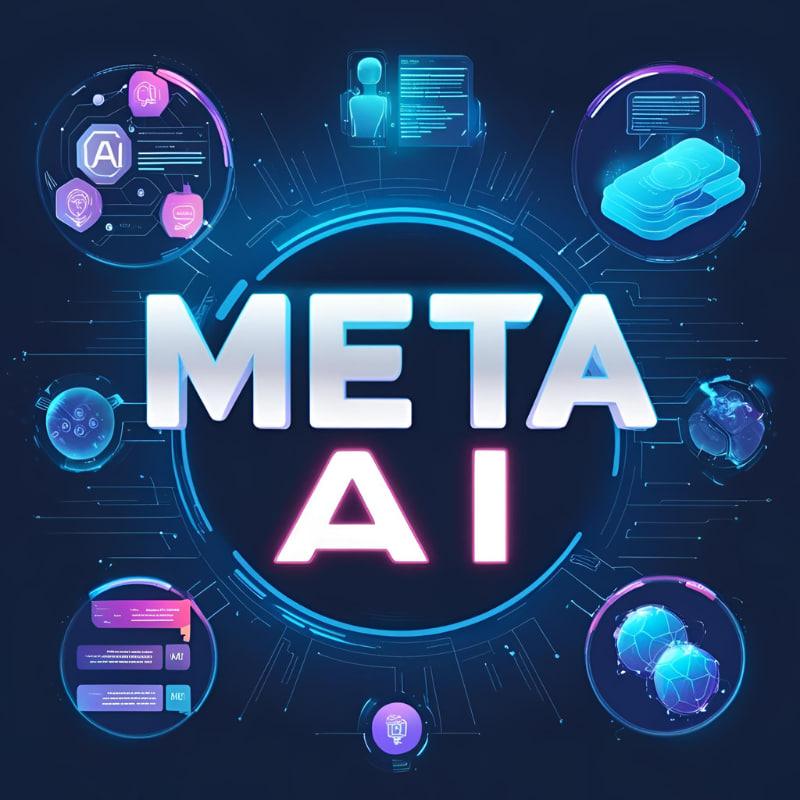
5 Free Tools to Transform Your Photos into Ghibli Style
How does Meta AI work?
Meta AI takes user requests and generates responses based on machine learning models trained on extensive data. But, you can ask Meta AI questions by typing or speaking and receive answers as an engaging conversation with Meta AI, generated text, or images based on the questions.
Meta AI is similar to other major AI platforms, such as OpenAI’s GPT Chat and Google’s Gemini AI, in that if you’ve used the other platform, you can quickly connect with Meta AI methods. However, Meta AI stands out due to its integration with Facebook and Instagram, platforms that many users are familiar with. This creates a more seamless experience for creating, sharing, and consuming content with AI.
If you can chat with a friend or brand on WhatsApp or Facebook Messenger, you know how to use and access artificial intelligence methods. Most AI models, with the impressive capabilities of Meta AI, are not without their limitations. The outputs are only as reliable as the data they are trained on and can sometimes produce inaccurate and misleading results.
Key Features of Meta AI
Like GPT’s chatbot, Meta AI can generate human-like text responses based on input. Whether you’re creating blog posts or looking for a quick answer to a question, the platform offers content generation with a conversational, informal tone.
Meta AI also offers features similar to platforms like DALL-E, where users can create images based on text descriptions. To start building an image, type /Imagine/ and then enter your command (for example: Imagine/ a cat on a skateboard).
Meta AI also has a voice mode if you don’t want to type. This option allows you to freely speak to the AI and receive a response in a conversational form. These instant responses are now available in various voice options, including those of celebrities like Awkwafina, Dame Judi Dench, John Cena, Keegan-Michael Key, and Kristen Bell. In addition to hands-free assistance, the enhanced voice mode is also helpful for language translation.
Meta AI personalizes content recommendations based on users’ behavior and preferences. This capability is a core part of Meta’s approach to improving user engagement through AI-driven personalization and is designed to enhance the social media experience.
Finally, video generation is not available in Google’s AI or OpenAI. Users can turn static images Meta AI generates into short, GIF-like videos perfect for social media.
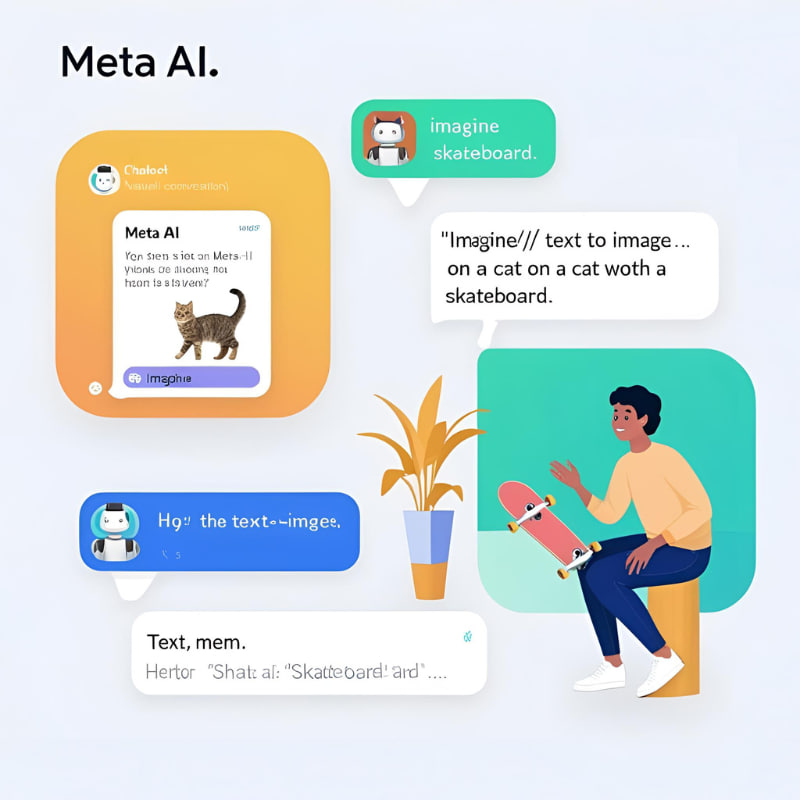
How to Use Meta AI
Meta AI can be accessed through Facebook Messenger, Instagram, and WhatsApp. The chatbot can be found anywhere there’s a chat interface. Depending on the platform you’re using, meta extensions may appear.
Meta AI is also accessible via www.meta.ai, although due to international sanctions, you’ll need to use a VPN to access the platform. You can use the AI app as a guest, but full functionality—including conversation history and image generation—requires logging in with your Instagram or Facebook account. There are reports that Meta is working on a standalone smartphone app called Meta shortly.
Meta AI is also integrated into the Meta Quest and Ray-Ban Meta smart glasses, where it acts as a voice-controlled assistant that can be activated with images from the built-in cameras. Meta AI is currently available to users in 22 countries, including the United States, Canada, Australia, and the United Kingdom, with support for more regions coming soon. Meta AI is not currently available in the European Union.
The Impact of Meta AI on Instagram and WhatsApp
Meta AI on Instagram significantly improves the user experience, increases engagement, and streames various processes. This technology is behind many of Instagram’s popular features, from smart face filters to suggesting related posts and stories, detecting inappropriate content, and combating online harassment and abuse.
One of the most obvious uses of AI on Instagram is the content display algorithm. By analyzing user behavior, interests, type of interactions, and length of time each post is viewed, this algorithm tries to show the most interesting content to each person. Tools like Instagram Reels also use AI to recommend videos users will likely engage with.
Meta AI has even entered the field of content production. For example, some new AI-based features allow users to receive suggested captions or get creative ideas for creating videos. On the other hand, machine learning-based systems play an essential role in detecting and removing fake, violent, or illegal content and help maintain cyberspace security. Overall, meta-AI has become the backbone of Instagram and is getting smarter every day. It can show users higher-quality content and provide a safer and more engaging experience.
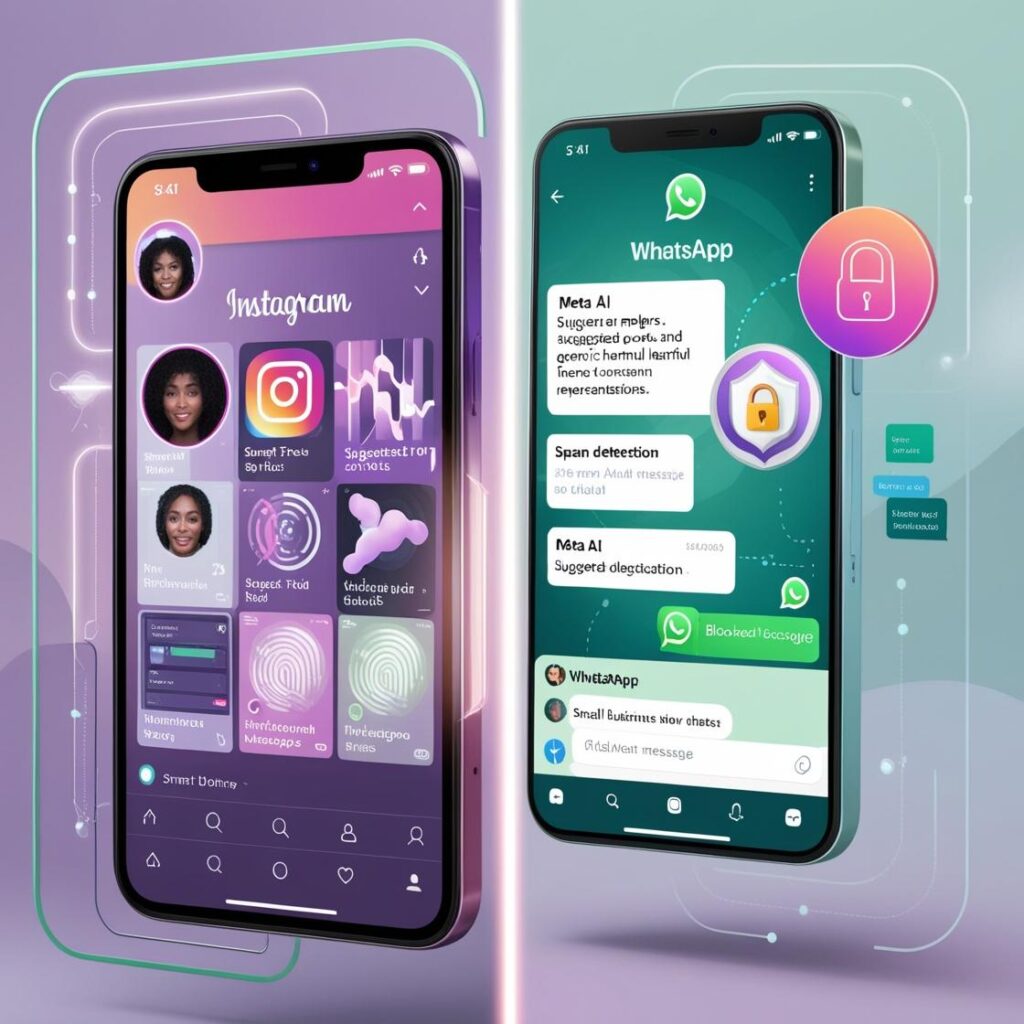
In WhatsApp, meta-AI also plays a vital role in improving communication, security, and user experience. Although WhatsApp’s appearance seems simple and unglamorous, behind this simplicity are advanced technologies, many of which are based on artificial intelligence.
One of the essential applications of Meta AI in WhatsApp is to combat spam, SMS scams, and the spread of misinformation. Meta’s machine learning algorithms continuously examine suspicious messages and behavior patterns to prevent the spread of harmful or annoying messages without violating users’ privacy because WhatsApp messages are encrypted. Meta AI in WhatsApp can also help businesses provide their services faster and more accurately through intelligent chatbots. These chatbots can answer frequently asked questions, place orders, or automatically report the status of product shipments. By developing these tools, Meta is trying to transform users’ experience of interacting with brands.
In the new beta versions of WhatsApp, features such as “Meta Intelligent Assistant” have also been seen. This tool can suggest AI-based responses to users, analyze chat content, and provide relevant information. These features are not yet widely available but show a brighter future for WhatsApp. While WhatsApp remains focused on simple and private communications, Meta AI is gradually and intelligently transforming the messenger into a more advanced, efficient, and secure tool.
Meta AI vs ChatGPT
Meta AI and ChatGPT are powerful AI technologies that serve different purposes. Here’s a brief look at each:
Meta AI is a general term for various AI-based features on Meta platforms (Facebook, WhatsApp, Instagram, etc.). The technology focuses on personalization, efficiency, and integration within apps. Meta AI seamlessly integrates into users’ daily lives, providing assistance and recommendations. Its benefits include personalized experiences, automation, and innovation. The platform’s challenges are similar to other AI applications, including privacy concerns, bias, and ethical dilemmas.
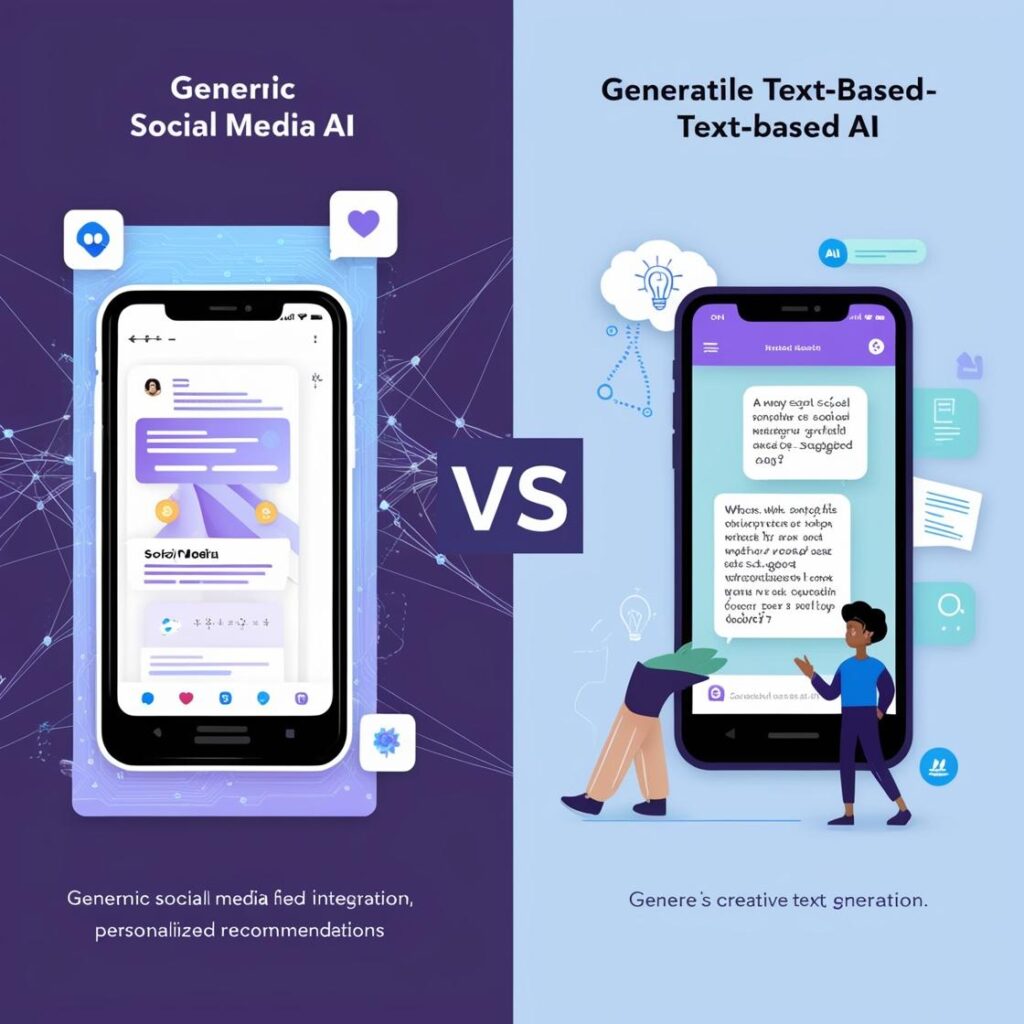
ChatGPT’s AI is a language model developed by OpenAI, like the one you currently interact with. The model excels at natural language understanding, conversation, and creative writing. This AI is officially multitasking, handling various tasks, from answering questions to writing scenarios and generating textual content. The advantages of this tool model are scalability and multitasking. Challenges that ChatGPT faces include occasional misinformation and limitations in understanding the subject matter.
In short, Meta AI and ChatGPT offer unique strengths. Meta AI excels in personalized and integrated experiences within its ecosystem, while ChatGPT provides high-quality and flexible conversational capabilities across multiple platforms.
What are the business applications of Meta AI?
Meta AI enhances users’ social relationships, helping them plan, initiate conversations, and make recommendations. However, meta-AI can find its way into a wide range of industries. Here are some potential business applications of meta AI:
Meta AI in Healthcare
Meta AI can help transform the healthcare sector by enabling better patient interactions and streamlining administrative processes. AI-powered chatbots and virtual health assistants can help patients easily access medical information, schedule appointments, and manage their finances. This technology can improve the overall patient experience and efficiency in healthcare management.
Meta AI in Business
Meta AI can improve business operations by providing advanced tools for customer engagement. AI-powered chatbots on meta platforms provide instant and personalized customer service, increasing user engagement and satisfaction. Businesses can use meta-AI to optimize customer engagement strategies and improve service quality.
Meta-AI in Education
Meta-AI can improve education by adapting to students’ individual needs. AI-based educational systems provide personalized learning experiences, assisting students in staying on track and working at their own pace. Teachers can also use AI to create engaging course materials, making learning more interactive and hands-on.
Meta-AI in Banking and Finance
Meta-AI can improve users’ interactions with finances by integrating intelligent assistants into financial services. These AI-based assistants can help users perform everyday banking tasks, such as checking account balances and processing transactions. Therefore, they can increase the convenience and efficiency of financial management.
Meta AI in Law
Meta AI can streamline legal processes by assisting with document review and data mining. These AI capabilities can help law firms manage cases efficiently and improve service quality and client satisfaction. By automating repetitive tasks, meta-AI can allow legal professionals to focus on the more complex aspects of their work.
Meta AI in Entertainment and Media
Meta AI can improve the entertainment experience by providing personalized recommendations and optimizing content delivery. AI-powered chatbots can help provide engaging media experiences to users through tailored video recommendations or automated content creation. This can ensure a delightful and customized user experience.

Meta-AI in Software Programming and IT Processes
Meta-AI can help software development by providing AI-based coding assistants. These assistants can help developers write and debug code efficiently, improving the quality of the software product. In addition, it can automate IT processes and allow teams to focus on more strategic tasks.
Meta AI in Security
Meta AI can improve security by integrating advanced threat detection and response systems. Assistants integrated with AI can monitor activities on Meta platforms, identify potential threats, and quickly mitigate risks. This mechanism can create a safer and more secure environment for users and businesses.
Meta AI in Manufacturing
Meta AI can optimize manufacturing processes through the Meta app ecosystem. It can increase factory productivity, enabling smoother operations and better collaboration between human workers and automated systems. This improvement can lead to increased efficiency and output in manufacturing.
Meta AI in Transportation
Meta AI can revolutionize transportation by helping with traffic management and logistics. This tool can help manage traffic flow, predict delays, and optimize routes, ensuring smooth and efficient transportation systems. This leads to better service delivery and improved user experiences in the transportation sector.
The future that Meta is drawing with AI!
In the future of technology, Meta is no longer just a social media company; it is a serious player on the global AI scene. From deeply integrating Meta’s AI into Facebook, Instagram, and WhatsApp to designing creative tools such as image, audio, and video production, Meta has shown that its vision for the future is ambitious and comprehensive.
What sets Meta apart from other tech giants is the open access to AI tools and its human-centric approach to integrating this technology into users’ daily lives. The company sees AI not as a separate product but as an integral part of human digital interactions. However, serious questions remain, including concerns about privacy, data bias, and the accuracy of the information it produces. But the reality is that Meta, with its vast resources, billions of users, and open research policies, is uniquely positioned to shape the future of AI.
The competition between Meta, Google, OpenAI, and others will likely benefit users as it accelerates innovation at an unprecedented pace. Meta’s AI future combines creativity, accessibility, power, and responsibility. It remains to be seen how smart it will be.

